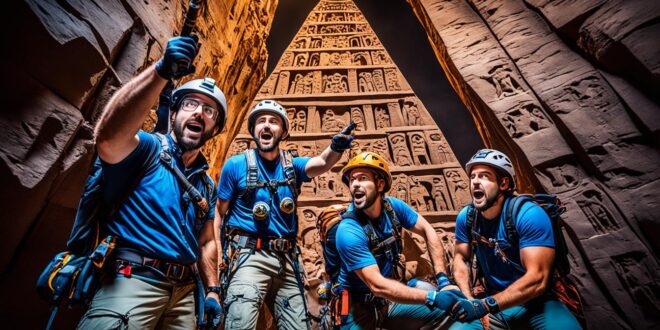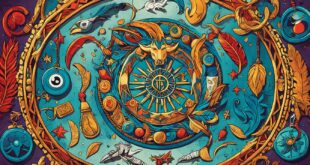The study of ancient civilizations provides us with valuable insights into the past, helping us understand how societies developed and the legacies they left behind. By exploring ancient cultures, we uncover the secrets of the past and learn from the history of our ancestors. Ancient civilizations hold a treasure trove of knowledge and mysteries that have shaped our modern world. From the architectural marvels to the enigmatic symbols, there is much to be discovered and learned from the secrets of ancient civilizations.
The Rosetta Stone: Cracking the Code of Ancient Egypt
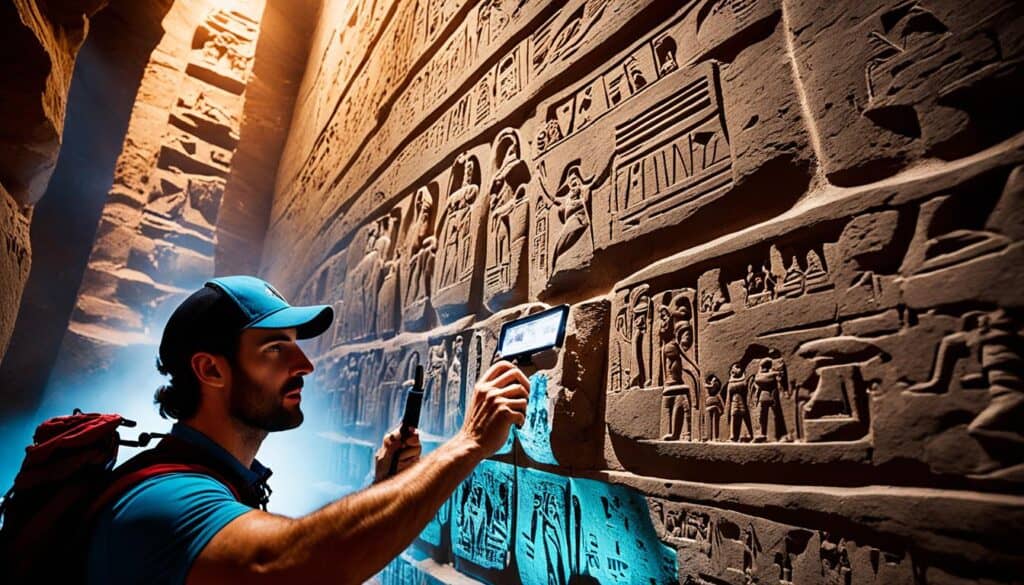
The Rosetta Stone, discovered in Egypt by Napoleon’s forces in 1799, played a pivotal role in deciphering the hieroglyphics of ancient Egypt. This plain-looking slab, covered in three types of writing including ancient Greek, allowed scholars to unravel the mysteries of Egyptian civilization and understand its rich history. The translation of the Rosetta Stone unveiled a decree of loyalty to the pharaoh at the time, shedding light on the ancient Egyptian civilization.
- With the discovery of the Rosetta Stone, the secrets of ancient Egyptian civilizations were finally unlocked.
- By comparing the different scripts on the stone, scholars were able to decipher the meaning of the hieroglyphics.
- The translation of the Rosetta Stone provided valuable insights into the social, political, and religious aspects of ancient Egypt.
The hieroglyphics on the Rosetta Stone were not only a form of communication but also a reflection of the beliefs and values of the ancient Egyptians. It revealed the reverence and loyalty the people had for their pharaoh, highlighting the importance of leadership and unity in ancient Egyptian society. The decipherment of the stone opened the doors to a deeper understanding of their culture and civilization.
Atlantia: Unraveling the Mysteries of a Forgotten Civilization
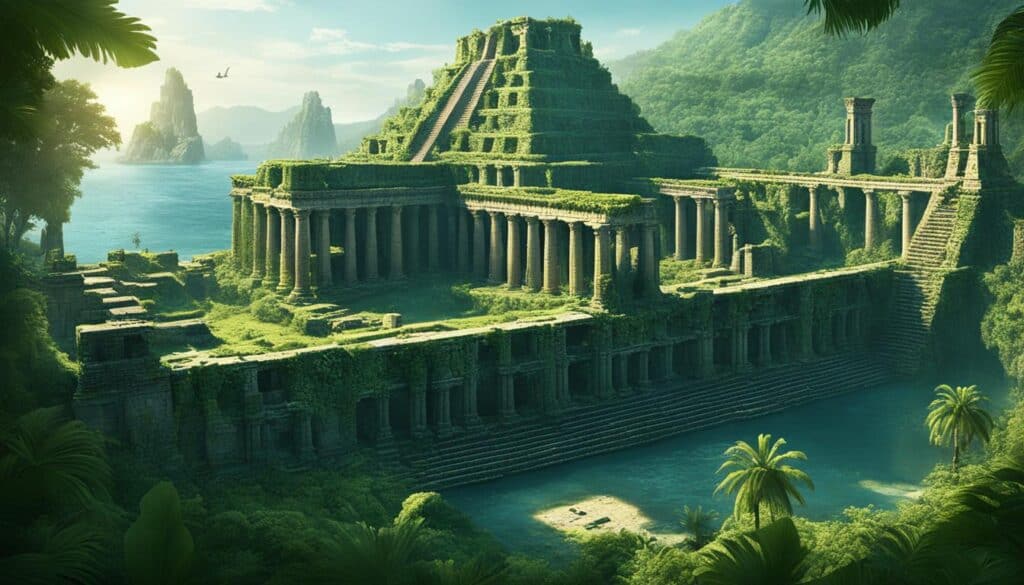
Archaeologists recently unearthed an extraordinary find in a remote jungle: the remnants of a civilization known as Atlantia. This forgotten civilization challenges our preconceived notions of human history and offers new insights into ancient world civilizations. The discovery reveals an advanced civilization with technological prowess and enigmatic symbols, sparking interest and curiosity among historians and scientists worldwide.
The remnants of Atlantia provide a glimpse into an ancient world civilization that existed thousands of years ago. The advanced technology found in their structures and artifacts raises questions about the level of knowledge and innovation they possessed.
The enigmatic symbols unearthed in Atlantia have puzzled experts, who are working tirelessly to decipher their meanings. These symbols may hold clues to understanding the ancient Roman civilization, African ancient civilizations, and the ancient Greek civilization, as well as their connections to other civilizations in the ancient world.
The existence of Atlantia challenges traditional narratives surrounding ancient civilizations and prompts us to reconsider our understanding of the past. It is a testament to the vastness of human history and the potential for further discoveries that may reshape our understanding of the ancient world.
The exploration of Atlantia continues to captivate the imagination of researchers and provides a fertile ground for future archaeological investigations. By unraveling the mysteries of this forgotten civilization, we gain valuable insights into the ancient world and the civilizations that came before us.
The Influence of Ancient Civilizations on Modern Society

Ancient civilizations have left an indelible mark on modern society, shaping our culture, architecture, and systems of governance. Exploring the mysteries of ancient architecture and studying the evolution of ancient societies allows us to gain a deeper appreciation for the achievements and advancements made by our ancestors.
One of the most striking examples of the influence of ancient cultures on modern society is seen in architecture. From the majestic pyramids of Egypt to the intricate temples of ancient Greece, ancient architectural techniques and designs continue to inspire modern architects.
Ancient civilizations also played a pivotal role in shaping our systems of governance. The concept of democracy, which originated in ancient Greece, continues to be a fundamental principle in many modern societies. The Roman Empire’s administrative structures and legal systems laid the foundation for modern governance and law.
Furthermore, the evolution of ancient societies provides us with valuable lessons and insights into human progress. By studying the rise and fall of ancient civilizations, such as the Mesopotamians, Egyptians, and Romans, we can learn from their triumphs and mistakes, guiding our own societal development.
Overall, the influence of ancient cultures on modern society is profound and far-reaching. By delving into the mysteries of ancient architecture and exploring the evolution of ancient societies, we gain a deeper understanding of our shared human heritage and the intricate threads that connect our past to the present.
The Legacy of Ancient Civilizations
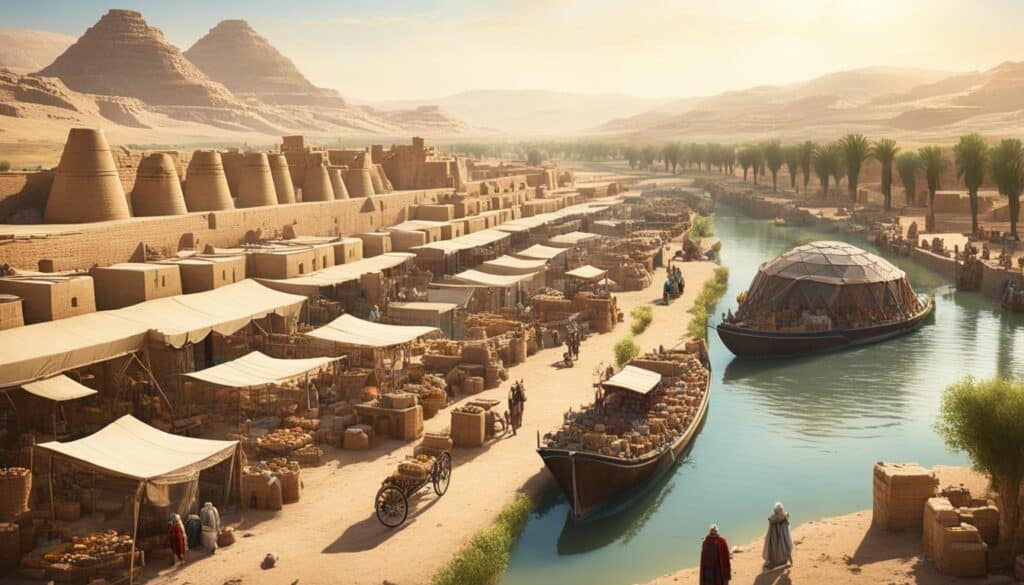
Ancient civilizations have left a lasting legacy, shaping our understanding of early human history. These ancient societies introduced remarkable cultural and intellectual achievements that continue to fascinate and inspire us today.
The Ancient Sumerian Civilization: The Birth of Writing
The ancient Sumerian civilization, located in Mesopotamia, played a significant role in human history. It is credited with introducing one of the most transformative inventions of all time: writing. The Sumerians developed a writing system known as cuneiform, which consisted of wedge-shaped symbols impressed onto clay tablets. This innovation marked the emergence of the written word and paved the way for the preservation and dissemination of knowledge.
The Pioneers of Egyptian Hieroglyphics
Ancient Egypt is renowned for its majestic pyramids, pharaohs, and the enigmatic hieroglyphics. The Egyptians developed a sophisticated writing system comprised of intricate pictorial symbols called hieroglyphics. These symbols represented objects, sounds, and ideas and were inscribed on stone monuments, papyrus scrolls, and temple walls. Deciphering the secrets of Egyptian hieroglyphics has unlocked a wealth of knowledge about ancient Egyptian culture, religion, and history.
By studying the ancient Sumerian civilization and the development of writing in Mesopotamia, as well as the intricate hieroglyphics of ancient Egypt, we gain insights into the intellectual and cultural achievements of our ancestors. These legacies continue to shape our understanding of human history and inspire our quest for knowledge and understanding.
Uncovering the Secrets of Ancient Ruins
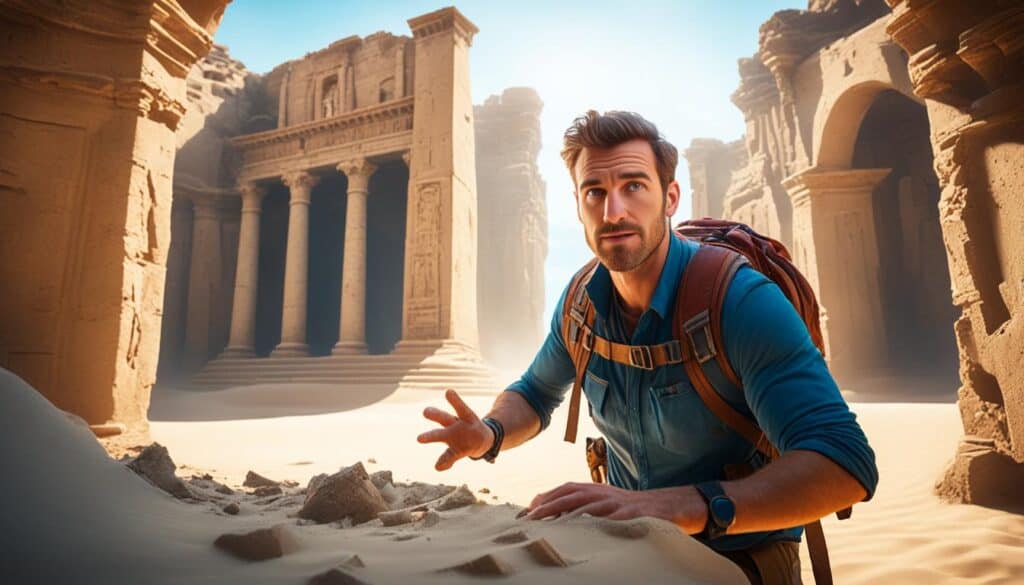
Ancient ruins hold a wealth of knowledge and secrets waiting to be uncovered. These remnants of past civilizations provide valuable insights into the daily lives, customs, and beliefs of ancient cultures. Through archaeological excavations, researchers and historians have pieced together fragments of history, shedding light on the mysteries of the past.
By studying ancient ruins, experts can uncover the secrets of lost civilizations and explore the evolution of human societies. These remains give us a glimpse into the architectural achievements, artistic expressions, and technological advancements of ancient cultures. Whether it’s the magnificent structures of the ancient Egyptians, the intricate mosaics of the Romans, or the grandeur of the Mayan temples, ancient ruins offer a window into the past.
Uncovering these secrets provides us with a deeper understanding of the past and its relevance to our present world. It allows us to explore the parallels between ancient societies and our own, drawing connections and learning from the successes and failures of those who came before us.
Archaeological discoveries are instrumental in reconstructing history and understanding the complexities of ancient cultures. These findings fuel our curiosity and drive to explore the secrets of the past, uncovering the hidden narratives that shaped our world. By delving into the wonders of ancient ruins, we embark on a captivating journey of exploration, connecting with our shared human heritage and unraveling the enigmatic tapestry of history.
Lessons from Ancient Empires
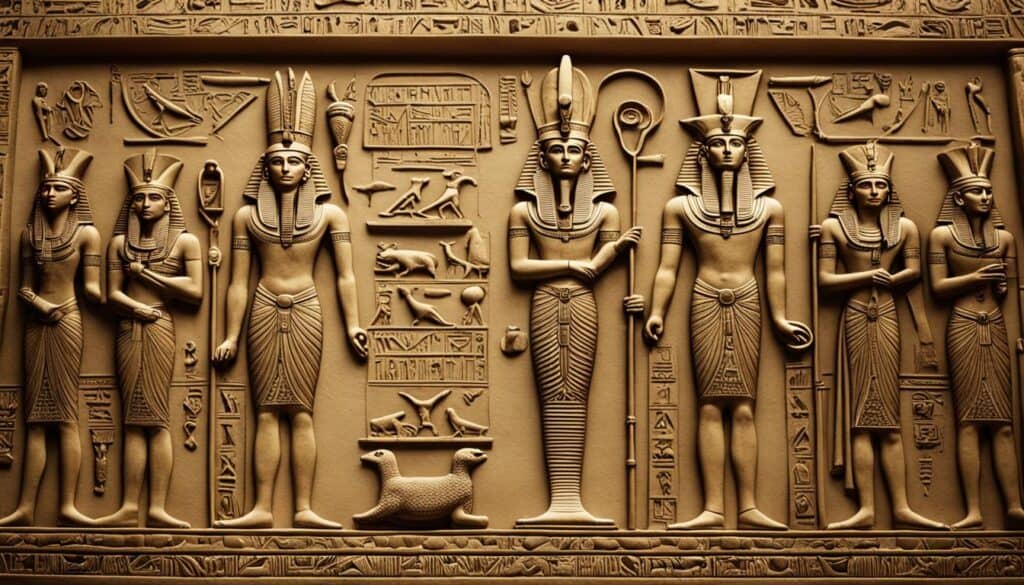
Ancient world civilizations have left behind a wealth of knowledge and wisdom that holds valuable lessons for modern society. By learning from ancient history, particularly the ancient Egyptian and Roman civilizations, we can gain insights into the consequences of power, the importance of governance, and the significance of cultural exchange.
Through the rise and fall of ancient empires, such as Ancient Egypt and the Roman Empire, we can understand the impact of power dynamics on societies. These ancient civilizations provide us with cautionary tales about the dangers of unchecked power and serve as a reminder to strive for a fair and balanced distribution of authority.
Governance was a central aspect of ancient empires, and studying their systems can help us shape our own institutions. Ancient Egypt’s pharaohs and Rome’s emperors exemplify different forms of rulership, showcasing the advantages and pitfalls of various governing structures. By examining their successes and failures, we can refine our understanding of effective governance and work towards building robust and just systems.
Ancient empires were also hubs of cultural exchange, where diverse groups came together, shared ideas, and created new knowledge. Both ancient Egypt and Rome benefited greatly from their openness to different cultures, resulting in the cross-pollination of ideas and the enrichment of their societies. Understanding the significance of cultural exchange can inspire us to promote inclusivity, diversity, and dialogue in today’s interconnected world.
By learning from the experiences and achievements of ancient civilizations, we can apply their lessons to our own lives and shape a better future. Ancient world civilizations, such as the Egyptian and Roman civilizations, remind us of the importance of power, governance, and cultural exchange. Let us delve into the treasures of the past, cultivating a deeper appreciation for the wisdom that ancient civilizations have to offer.
The Evolution of Ancient Societies
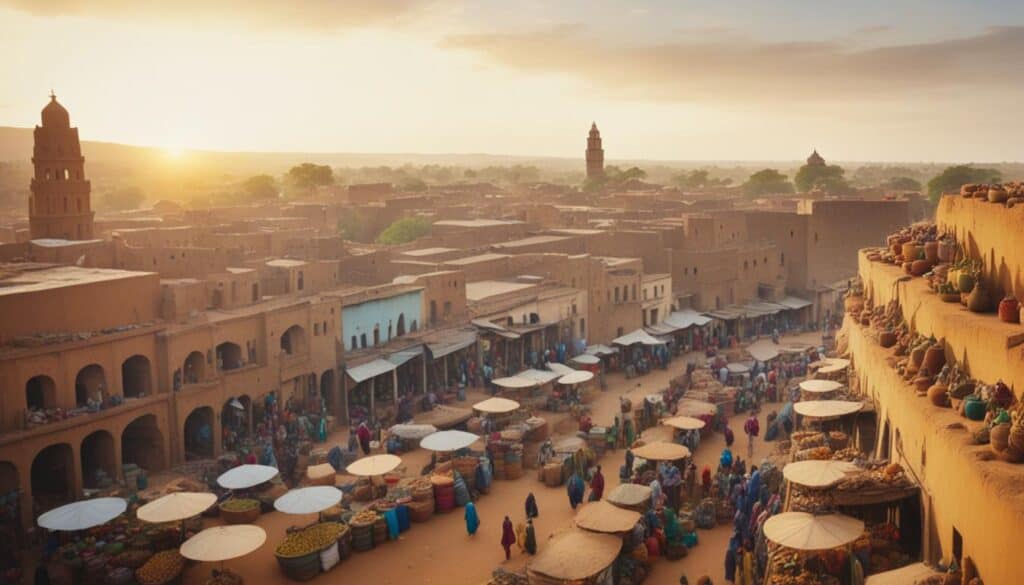
Ancient societies underwent significant evolutionary processes, leading to the development of complex social structures, economic systems, and cultural practices. From African civilizations to the ancient Greeks and Romans, these ancient world civilizations influenced the course of human history in profound ways.
African ancient civilizations, such as the Kingdom of Kush and the Mali Empire, flourished along the Nile River and the West African coast, respectively. These civilizations were known for their sophisticated trade networks, architectural achievements, and rich cultural traditions. The Kingdom of Kush, for instance, developed close ties with ancient Egypt and adopted many aspects of Egyptian culture.
Ancient Greek civilization, on the other hand, contributed immensely to the fields of philosophy, literature, and government. Known as the birthplace of democracy, ancient Greece established the foundation for modern political systems. Greek philosophers, including Socrates, Plato, and Aristotle, revolutionized the way humans pondered the meaning of life and the nature of knowledge.
The ancient Roman civilization built upon the achievements of previous cultures and created one of the most extensive empires in history. The Romans excelled in engineering, architecture, and administration. Their vast road networks, aqueducts, and monumental structures still marvel us today. The Roman legal system and governance principles laid the groundwork for modern legal systems and institutions.
Studying the evolution of these ancient societies provides valuable insights into the progress and challenges that shaped human history. By understanding the practices, beliefs, and accomplishments of African ancient civilizations, ancient Greek civilization, and ancient Roman civilization, we can gain a deeper appreciation for the advancements made by our ancestors and the legacies they left behind.
Decoding Ancient Architecture and Engineering
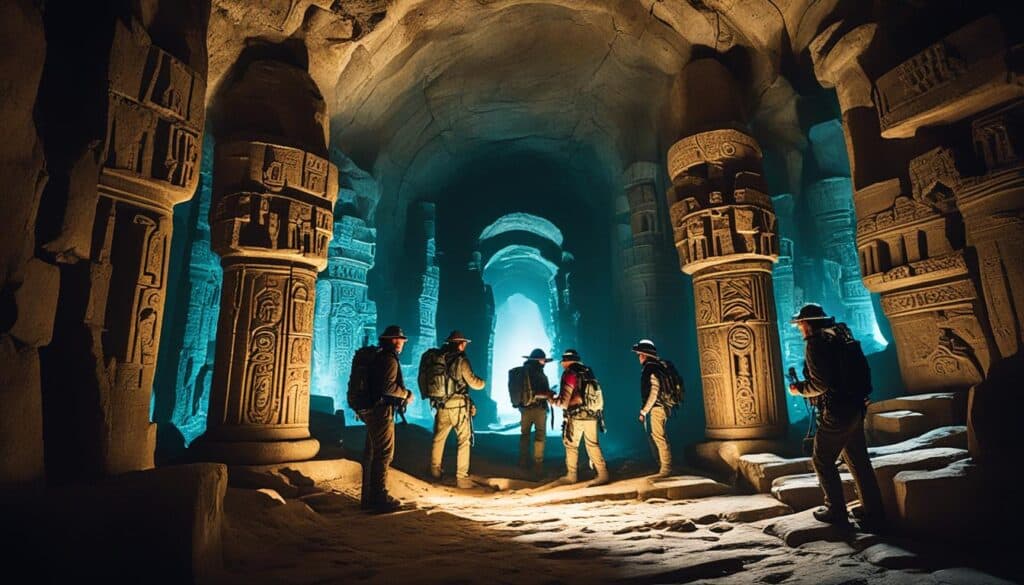
Ancient civilizations showcased remarkable skills and ingenuity through their architectural and engineering endeavors. Exploring the mysteries of ancient architecture allows us to delve into the sophisticated techniques employed by civilizations such as the ancient Sumerians, Egyptians, and Romans.
One of the most striking examples of ancient architectural prowess is found in the ziggurats built by the ancient Sumerians. These monumental structures were not only awe-inspiring in their size and grandeur but also served as religious complexes where the Sumerians worshipped their gods. Decoding the construction techniques and intricate designs of these ziggurats provides us with insights into the religious beliefs, social systems, and technological capabilities of the ancient Sumerian civilization.
The pyramids of Egypt stand as enduring symbols of ancient Egyptian civilization. The precision and mathematical precision with which these imposing structures were built continue to astonish researchers today. By studying the architectural techniques used in the construction of the pyramids, we gain a deeper appreciation for the cultural and religious significance they held for the ancient Egyptians. The architectural mastery displayed in the pyramids is a testament to the ingenuity and engineering capabilities of this ancient civilization.
The architectural achievements of the Romans are renowned for their grandeur and innovation. From the magnificent Colosseum to the aqueducts that brought water to their cities, the Romans excelled in creating awe-inspiring structures that blended beauty, functionality, and engineering brilliance. Uncovering the secrets behind the construction and design of these architectural marvels offers us a glimpse into the advanced engineering techniques employed by the ancient Romans and their enduring impact on architectural practices that followed.
Decoding ancient architecture not only allows us to appreciate the skill and creativity of our ancestors but also provides valuable insights into the societal, cultural, and technological advancements of ancient civilizations. By studying and understanding these architectural wonders, we gain a deeper understanding of the rich history and heritage that has shaped our world.
Unveiling the Enigmas of Ancient Languages
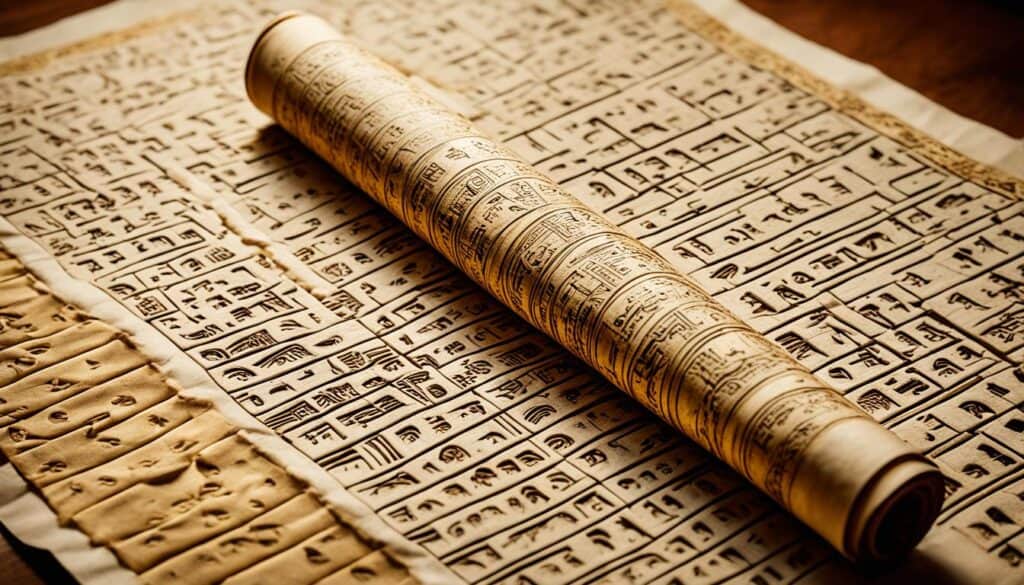
Ancient civilizations left behind a wealth of knowledge, but much of it remained shrouded in mystery. One of the keys to unlocking these secrets lies in deciphering ancient languages. Languages such as Sumerian, Egyptian hieroglyphics, and ancient Greek hold the power to reveal the cultures, beliefs, and customs of these past civilizations.
Through the painstaking efforts of linguists and historians, significant progress has been made in piecing together the linguistic puzzle of the past. Deciphering these ancient languages has provided invaluable insights into the lives and societies of ancient Sumerian civilization, the civilizations in ancient Mesopotamia, ancient Egyptian civilizations, and ancient Greek civilization.
For example, the Sumerian language, which dates back over 5,000 years, was the language of an ancient civilization in Mesopotamia. By decoding Sumerian texts and clay tablets, historians have gained a deeper understanding of the Sumerian civilization’s social structure, religious beliefs, and legal systems.
The ancient Egyptian hieroglyphics, once considered an unsolvable mystery, have also been deciphered. Scholars have unlocked the ancient Egyptian writing system, revealing the rich history and mythology of this ancient civilization. The translation of hieroglyphic inscriptions has shed light on the pharaohs, their reigns, and the religious practices of ancient Egypt.
Ancient Greek, considered the foundation of Western civilization, has played a crucial role in shaping our modern world. By studying ancient Greek literature, philosophy, and historical records, we gain insights into the ancient Greek civilization’s intellectual prowess and influential contributions to art, science, and governance.
Through the ongoing study and decipherment of ancient languages, we continue to unravel the mysteries of ancient civilizations and gain a deeper appreciation for the richness and diversity of human history.
Rediscovering Lost Knowledge
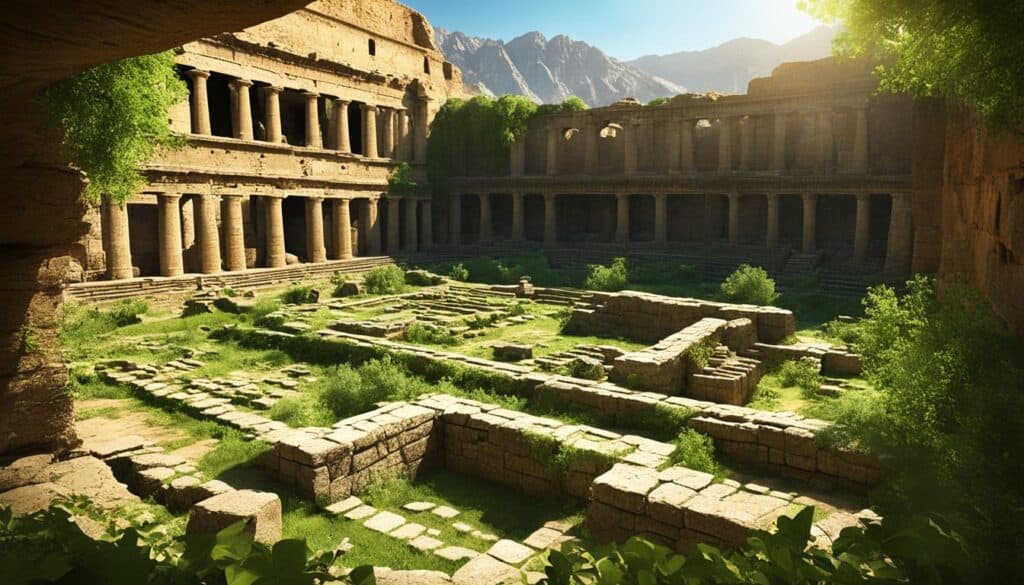
Ancient civilizations were repositories of vast knowledge and wisdom, much of which has been lost to time. However, by diligently exploring ancient cultures, learning from their history, and uncovering the secrets of ancient ruins, we can revive and expand our understanding of the world.
The study of ancient history allows us to delve into the ideas, technologies, and philosophies of our ancestors. By immersing ourselves in their knowledge, we gain valuable insights that can inform our present-day innovations and advancements. Ancient civilizations hold a treasure trove of wisdom that can help us tackle modern challenges.
One of the ways we rediscover lost knowledge is through the exploration of ancient cultures. By studying the beliefs, practices, and achievements of these civilizations, we can gain a deeper understanding of their contributions to human development. From the intricate architecture of the ancient Egyptians to the mathematical prowess of the ancient Greeks, each civilization offers unique insights and lessons.
Learning from Ancient History
Ancient history provides us with a wealth of lessons that can shape our present and future. By examining the rise and fall of ancient empires and the consequences of their actions, we can gain insights into effective governance, cultural exchange, and the influence of power. By understanding the past, we can make informed decisions that create a better future.
Ancient ruins play a vital role in uncovering lost knowledge. Through archaeological excavations, we unearth remnants of ancient civilizations that reveal their daily lives, customs, and beliefs. The secrets buried within these ruins open a window into the past, offering us a glimpse of vanished worlds and their invaluable lessons.
Expanding Our Knowledge
By expanding our knowledge through the exploration of ancient cultures and the study of their achievements, we can create a bridge between the past and the present. Our ancestors laid the foundation for our modern world, and through learning from their wisdom, we can build upon their achievements and continue to innovate.
As we uncover the secrets of ancient history, we gain a deeper appreciation for the complexities and diversity of human civilizations. Through this journey, we develop a more comprehensive understanding not only of our shared human heritage, but also of the challenges and triumphs that shaped our world.
Rediscovering lost knowledge allows us to tap into the collective wisdom of ancient civilizations. Through their achievements, ideas, and philosophies, we can expand our understanding of the world and enhance our ability to address the pressing issues of our time.
Continue reading: Section 12 – The Enduring Appeal of Ancient Civilizations
The Enduring Appeal of Ancient Civilizations
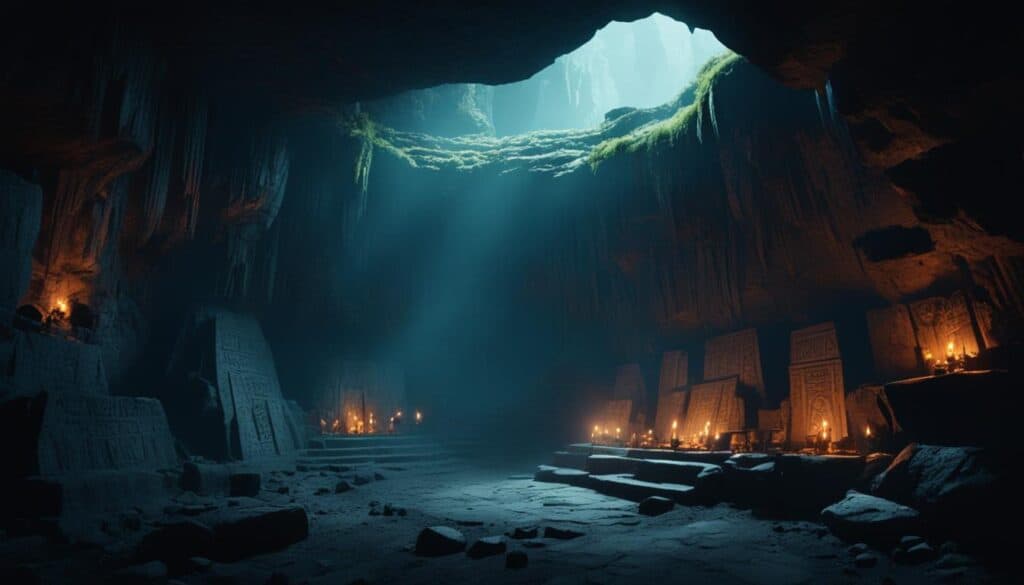
The allure of ancient civilizations continues to captivate people around the world. Whether it’s the mysteries of the ancient Sumerians or the grandeur of the Roman Empire, these ancient world civilizations hold a timeless fascination for humanity. By delving into the secrets of the past, we gain a deeper understanding and appreciation for the complexities of ancient societies.
Ancient sumerian civilization, with its advanced knowledge and innovations, captivates our imagination. From the development of writing to the creation of the wheel, the ancient Sumerians paved the way for future civilizations and laid the foundations of human progress.
The ancient roman civilization, known for its architectural marvels and impressive governance, has left an indelible mark on history. The grand structures such as the Colosseum and the aqueducts still inspire awe and wonder today. The principles of law and governance established by the Romans continue to shape our modern systems.
By exploring these ancient world civilizations, we enrich our understanding of the past and gain insights into our shared human heritage. The secrets of the past hold valuable lessons and stories that offer guidance and inspiration for our present and future endeavors.
The Quest for Knowledge and Understanding
The study of ancient civilizations is a never-ending journey in our quest for knowledge and understanding. By exploring the rich tapestry of ancient cultures, we unravel the secrets of the past and gain valuable insights into our own history.
Through learning from the triumphs and mistakes of those who came before us, we grow wiser and more enlightened. The ancient ruins that stand as a testament to once-great civilizations hold the key to unlocking the mysteries of bygone eras and offer clues to our collective human development.
Exploring ancient cultures allows us to delve into the depths of their achievements, their customs, and the wisdom they imparted. It is through this exploration that we deepen our understanding of the world and our place in it.
 Fullersears
Fullersears
